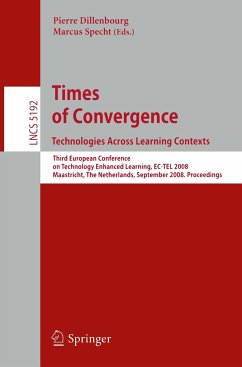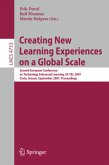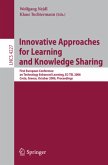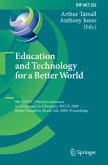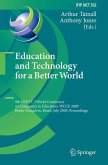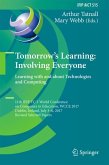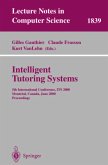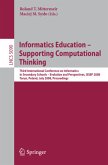Times of Convergence. Technologies Across Learning Contexts
Third European Conference on Technology Enhanced Learning, EC-TEL 2008, Maastricht, The Netherlands, September 16-19, 2008, Proceedings
Herausgegeben:Dillenbourg, Pierre; Specht, Marcus
Times of Convergence. Technologies Across Learning Contexts
Third European Conference on Technology Enhanced Learning, EC-TEL 2008, Maastricht, The Netherlands, September 16-19, 2008, Proceedings
Herausgegeben:Dillenbourg, Pierre; Specht, Marcus
- Broschiertes Buch
- Merkliste
- Auf die Merkliste
- Bewerten Bewerten
- Teilen
- Produkt teilen
- Produkterinnerung
- Produkterinnerung
The European Conference on Technology-Enhanced Learning (EC-TEL 2008) was the third event of a series that started in 2006. The two first editions were organized by Pro- Learn , a European Network of Excellence. In 2008, several members of Kaleidoscope, the other European Network of Excellence , joined as co-chair, committee members, reviewers and authors. These two networks are no longer funded, but our aim was to turn EC-TEL into a sustainable series of high-quality events and thereby to contribute to the scientific landscape of technology-enhanced learning. A new network, named STELLAR,…mehr
Andere Kunden interessierten sich auch für
![Creating New Learning Experiences on a Global Scale Creating New Learning Experiences on a Global Scale]() Erik Duval (Volume ed.) / Ralf Klamma / Martin WolpersCreating New Learning Experiences on a Global Scale38,99 €
Erik Duval (Volume ed.) / Ralf Klamma / Martin WolpersCreating New Learning Experiences on a Global Scale38,99 €![Innovative Approaches for Learning and Knowledge Sharing Innovative Approaches for Learning and Knowledge Sharing]() Wolfgang Nejdl / Klaus Tochtermann (eds.)Innovative Approaches for Learning and Knowledge Sharing82,99 €
Wolfgang Nejdl / Klaus Tochtermann (eds.)Innovative Approaches for Learning and Knowledge Sharing82,99 €![Education and Technology for a Better World Education and Technology for a Better World]() Education and Technology for a Better World81,99 €
Education and Technology for a Better World81,99 €![Education and Technology for a Better World Education and Technology for a Better World]() Education and Technology for a Better World75,99 €
Education and Technology for a Better World75,99 €![Tomorrow's Learning: Involving Everyone. Learning with and about Technologies and Computing Tomorrow's Learning: Involving Everyone. Learning with and about Technologies and Computing]() Tomorrow's Learning: Involving Everyone. Learning with and about Technologies and Computing76,99 €
Tomorrow's Learning: Involving Everyone. Learning with and about Technologies and Computing76,99 €![Intelligent Tutoring Systems Intelligent Tutoring Systems]() Gilles Gauthier / Claude Frasson / Kurt VanLehn (eds.)Intelligent Tutoring Systems81,99 €
Gilles Gauthier / Claude Frasson / Kurt VanLehn (eds.)Intelligent Tutoring Systems81,99 €![Informatics Education - Supporting Computational Thinking Informatics Education - Supporting Computational Thinking]() Roland Mittermeir / Maciej M. Syslo (eds.)Informatics Education - Supporting Computational Thinking38,99 €
Roland Mittermeir / Maciej M. Syslo (eds.)Informatics Education - Supporting Computational Thinking38,99 €-
-
-
The European Conference on Technology-Enhanced Learning (EC-TEL 2008) was the third event of a series that started in 2006. The two first editions were organized by Pro- Learn , a European Network of Excellence. In 2008, several members of Kaleidoscope, the other European Network of Excellence , joined as co-chair, committee members, reviewers and authors. These two networks are no longer funded, but our aim was to turn EC-TEL into a sustainable series of high-quality events and thereby to contribute to the scientific landscape of technology-enhanced learning. A new network, named STELLAR, will be launched in 2009, with members from both existing networks as well as new members and will support the future editions of this conference. The scope of EC-TEL 2008 covered the different fields of learning technologies: e- cation, psychology, computer science. The contributions in this volume address the - sign of innovative environments, computational models and architectures, results of empirical studies on socio-cognitive processes, field studies regarding the use of te- nologies in context, collaborative processes, pedagogical scenarios, reusable learning objects and emerging objects, groups and communities, learning networks, interaction analysis, metadata, personalization, collaboration scripts, learning adaptation, collabo- tive environments, resources, tangible tools, as well as learning management systems.
Produktdetails
- Produktdetails
- Lecture Notes in Computer Science 5192
- Verlag: Springer / Springer Berlin Heidelberg / Springer, Berlin
- Artikelnr. des Verlages: 12525799, 978-3-540-87604-5
- 2008
- Seitenzahl: 496
- Erscheinungstermin: 8. September 2008
- Englisch
- Abmessung: 235mm x 155mm x 27mm
- Gewicht: 745g
- ISBN-13: 9783540876045
- ISBN-10: 3540876049
- Artikelnr.: 25047398
- Herstellerkennzeichnung Die Herstellerinformationen sind derzeit nicht verfügbar.
- Lecture Notes in Computer Science 5192
- Verlag: Springer / Springer Berlin Heidelberg / Springer, Berlin
- Artikelnr. des Verlages: 12525799, 978-3-540-87604-5
- 2008
- Seitenzahl: 496
- Erscheinungstermin: 8. September 2008
- Englisch
- Abmessung: 235mm x 155mm x 27mm
- Gewicht: 745g
- ISBN-13: 9783540876045
- ISBN-10: 3540876049
- Artikelnr.: 25047398
- Herstellerkennzeichnung Die Herstellerinformationen sind derzeit nicht verfügbar.
Using Interaction Analysis to Reveal Self-Regulated Learning in Virtual Communities.- Evaluating Spatial Knowledge through Problem-Solving in Virtual Learning Environments.- Role-Play Virtual Environments: Recreational Learning of Software Design.- A Socio-technical Approach towards Supporting Intra-organizational Collaboration.- Reflect: An Interactive Table for Regulating Face-to-Face Collaborative Learning.- Face to Face Cooperation with CoFFEE.- The Influence of the Faculty Attitude on the Adoption of ICTs' Innovations for Learning Purposes: Analysis of a Shared Web.- Flexible Analysis of User Actions in Heterogeneous Distributed Learning Environments.- A Service Providing Awareness of Learning Object Evolutions in a Distributed Environment.- ALOA: A Web Services Driven Framework for Automatic Learning Object Annotation.- Reusing Collaborative Knowledge as Learning Objects -The Implementation and Evaluation of AnnForum.- Evaluation of Interoperability between MOT and Regular Learning Management Systems.- Implications of Writing, Reading, and Tagging on the Web for Reflection Support in Informal Learning.- A Distributed Ontological Approach as a Basis for Software in the Context of Academic Programs.- Systems Engineering for Technology Enhanced Learning.- Defining Adaptation in a Generic Multi Layer Model: CAM: The GRAPPLE Conceptual Adaptation Model.- Imperfect Answers in Multiple Choice Questionnaires.- Towards a Semantic-Rich Collaborative Environment for Learning Software Patterns.- Tinkering or Sketching: Apprentices' Use of Tangibles and Drawings to Solve Design Problems.- Design of an Annotation Tool to Support Simulation Training of Medical Teams.- A Domain-Specific-Modeling Approach to Support Scenarios-Based Instructional Design.- A Heuristic NLPBased Approach for Getting Didactic Resources from Electronic Documents.- Fostering Self-Directed Learning with Social Software: Social Network Analysis and Content Analysis.- Capture of Lifecycle Information to Support Personal Information Management.- A Model of Re-use of E-Learning Content.- Knowledge Services for Work-Integrated Learning.- Designing Software for Pupils with Special Needs: Analysis of an Example for Complementary Action Design.- Adaptation in the Context of Explanatory Visualization.- Interaction Analysis Supporting Participants' Self-regulation in a Generic CSCL System.- WHURLE 2.0: Adaptive Learning Meets Web 2.0.- Towards Accessing Disparate Educational Data in a Single, Unified Manner.- Bridging the Gap between Practitioners and E-Learning Standards: A Domain-Specific Modeling Approach.- Supporting Learners' Organization in Collective Challenges.- When Co-learners Work on Complementary Texts: Effects on Outcome Convergence.- Using LEGO Mindstorms as an Instructional Aid in Technical and Vocational Secondary Education: Experiences from an Empirical Case Study.- Measuring Learning Object Reuse.- Issues in the Design of an Environment to Support the Learning of Mathematical Generalisation.- ISiS: An Intention-Oriented Model to Help Teachers in Learning Scenarios Design.- Open Educational Resources: Inquiring into Author Reuse Behaviors.- No Guru, No Method, No Teacher: Self-classification and Self-modelling of E-Learning Communities.- Extraction of Socio-semantic Data from Chat Conversations in Collaborative Learning Communities.- Knowledge Processing and Contextualisation by Automatical Metadata Extraction and Semantic Analysis.- Knowing What the Peer Knows: The Differential Effect of Knowledge Awareness on Collaborative Learning Performanceof Asymmetric Pairs.- Onto'CoPE: Ontology for Communities of Practice of E-Learning.- A Flexible and Tailorable Architecture for Scripts in F2F Collaboration.- Semantic Technologies for Socially-Enhanced Context-Aware Mobile Learning.- Knowledge Practices Environment: Design and Application of Technology for Trialogical Learning.- Towards Lightweight LMS 2.0: A Blog-Based Approach to Online Assessment.- CoChemEx: Supporting Conceptual Chemistry Learning Via Computer-Mediated Collaboration Scripts.- Immediate Elaborated Feedback Personalization in Online Assessment.- Application of Petri Nets on the Execution of IMS Learning Design Documents.- A Supporting Architecture for Generic Service Integration in IMS Learning Design.
Using Interaction Analysis to Reveal Self-Regulated Learning in Virtual Communities.- Evaluating Spatial Knowledge through Problem-Solving in Virtual Learning Environments.- Role-Play Virtual Environments: Recreational Learning of Software Design.- A Socio-technical Approach towards Supporting Intra-organizational Collaboration.- Reflect: An Interactive Table for Regulating Face-to-Face Collaborative Learning.- Face to Face Cooperation with CoFFEE.- The Influence of the Faculty Attitude on the Adoption of ICTs' Innovations for Learning Purposes: Analysis of a Shared Web.- Flexible Analysis of User Actions in Heterogeneous Distributed Learning Environments.- A Service Providing Awareness of Learning Object Evolutions in a Distributed Environment.- ALOA: A Web Services Driven Framework for Automatic Learning Object Annotation.- Reusing Collaborative Knowledge as Learning Objects -The Implementation and Evaluation of AnnForum.- Evaluation of Interoperability between MOT and Regular Learning Management Systems.- Implications of Writing, Reading, and Tagging on the Web for Reflection Support in Informal Learning.- A Distributed Ontological Approach as a Basis for Software in the Context of Academic Programs.- Systems Engineering for Technology Enhanced Learning.- Defining Adaptation in a Generic Multi Layer Model: CAM: The GRAPPLE Conceptual Adaptation Model.- Imperfect Answers in Multiple Choice Questionnaires.- Towards a Semantic-Rich Collaborative Environment for Learning Software Patterns.- Tinkering or Sketching: Apprentices' Use of Tangibles and Drawings to Solve Design Problems.- Design of an Annotation Tool to Support Simulation Training of Medical Teams.- A Domain-Specific-Modeling Approach to Support Scenarios-Based Instructional Design.- A Heuristic NLPBased Approach for Getting Didactic Resources from Electronic Documents.- Fostering Self-Directed Learning with Social Software: Social Network Analysis and Content Analysis.- Capture of Lifecycle Information to Support Personal Information Management.- A Model of Re-use of E-Learning Content.- Knowledge Services for Work-Integrated Learning.- Designing Software for Pupils with Special Needs: Analysis of an Example for Complementary Action Design.- Adaptation in the Context of Explanatory Visualization.- Interaction Analysis Supporting Participants' Self-regulation in a Generic CSCL System.- WHURLE 2.0: Adaptive Learning Meets Web 2.0.- Towards Accessing Disparate Educational Data in a Single, Unified Manner.- Bridging the Gap between Practitioners and E-Learning Standards: A Domain-Specific Modeling Approach.- Supporting Learners' Organization in Collective Challenges.- When Co-learners Work on Complementary Texts: Effects on Outcome Convergence.- Using LEGO Mindstorms as an Instructional Aid in Technical and Vocational Secondary Education: Experiences from an Empirical Case Study.- Measuring Learning Object Reuse.- Issues in the Design of an Environment to Support the Learning of Mathematical Generalisation.- ISiS: An Intention-Oriented Model to Help Teachers in Learning Scenarios Design.- Open Educational Resources: Inquiring into Author Reuse Behaviors.- No Guru, No Method, No Teacher: Self-classification and Self-modelling of E-Learning Communities.- Extraction of Socio-semantic Data from Chat Conversations in Collaborative Learning Communities.- Knowledge Processing and Contextualisation by Automatical Metadata Extraction and Semantic Analysis.- Knowing What the Peer Knows: The Differential Effect of Knowledge Awareness on Collaborative Learning Performanceof Asymmetric Pairs.- Onto'CoPE: Ontology for Communities of Practice of E-Learning.- A Flexible and Tailorable Architecture for Scripts in F2F Collaboration.- Semantic Technologies for Socially-Enhanced Context-Aware Mobile Learning.- Knowledge Practices Environment: Design and Application of Technology for Trialogical Learning.- Towards Lightweight LMS 2.0: A Blog-Based Approach to Online Assessment.- CoChemEx: Supporting Conceptual Chemistry Learning Via Computer-Mediated Collaboration Scripts.- Immediate Elaborated Feedback Personalization in Online Assessment.- Application of Petri Nets on the Execution of IMS Learning Design Documents.- A Supporting Architecture for Generic Service Integration in IMS Learning Design.

